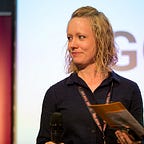Why we make the OneTeamGov podcast
This blogpost is the first of two in which we share our experiences of creating the OneTeamGov podcast. Read the second part here.
By writing we would like to:
- share our motivations in the hope they inspire others
- provide practical tips on how to create your own podcast
- reach new audiences and find new people to interview
The background
Back in March an email dropped into my inbox from my friend Kamala, subject line: “the idea”. An avid podcast listener and passionate about public service, Kamala’s idea was simple — we collaborate to record conversations with people doing cool stuff in government and publish them as a podcast for the OneTeamGov community.
Since moving to Wellington and Ottawa respectively, we’d both felt homesick for our friends and colleagues back in London. For the past five years we’d been privileged enough to be part of a tight-knit and supportive community of folks motivated to create real change, and it felt strange to be adrift from that.
We missed our OneTeamGov tribe. We had a pretty strong hunch that other people might feel the same, particularly in disparate communities, and wanted to find a way to help maintain and grow those human connections.
There are plenty of podcasts about p/Politics, policymaking, technology, and business, but as Kamala put it:
“I don’t think the average person finds them that interesting, as they don’t talk about things that would affect them or people that they know”
Yet we saw plenty of evidence that people were interested in connecting with fellow public servants — just look at Twitter, the hundreds of blogposts, and the dozens of government conferences that happen every year.
We wanted to focus on the humans, and reckoned this might be a gap OneTeamGov could fill.
So what’s the mission?
As we noodled on the idea, we thought about the value a podcast could add to the OneTeamGov community. By focusing on human storytelling, and sharing experiences, experiments, practices, success and failures, we wanted to inspire people towards practical action.
Being inclusive was always going to be a core value; so we’d seek to grow a broad range of listeners and interviewees to represent diverse and thought provoking views. And we hoped to be able to have an impact on a global scale.
Reasons we thought we could be good at this
- Teamwork: We already had a strong track record of working together on passion projects at the Ministry of Justice (creating the LGBTQ* society, organising diversity events, championing inclusion) and together we get shit done.
- International connections: We’ve both worked across a number of UK government departments, and having recently moved to new roles in Wellington and Ottawa public service, we reckoned the foundations were there for a global audience.
- Fun: Lots of the existing policy podcasts are pretty dry, and reflect a traditional male and pale perspective. We’re fun and queer and different. We have high quality banter and know how to connect with people on a personal level.
What we were missing
We had no idea how to make a podcast. We did however have a small amount of experience in interviewing and being interviewed. Following an internal competition where staff voted for their favourite sounding voice, my lilting Scottish tones stood out from the RP crowd and won me the chance to present the Penguin Books podcast*, which I did for the best part of a year. Kamala and I were also interviewed by Cathy White for the Geek Girl Meets podcast; a show we really admire and would be stoked to be able to emulate.
*my favourite interview was with the Brownlee brothers, but that’s a whole other blogpost
We also foresaw a number of logistical challenges. We live across 16hrs of time difference. We didn’t know how much recording equipment and editing software would cost. And we had no idea how to get our content out to the right channels.
And most daunting of all; did anyone else care about this stuff enough to listen?
We felt it was worth a shot.
Sharing our idea
We decided to pitch the idea to the OneTeamGov organising crew on their regular Friday afternoon call. In preparation, we used a business model canvas to clarify our thinking.
Vision: a podcast featuring real conversations with awesome people doing interesting stuff in government and the public sector
Problem statement: OneTeamGov has proven there is widespread passion for public sector reform. Networks are growing, but with such a disparate geographical spread it’s easy to feel disconnected outside of the core community. By providing sources of inspiration, learning, and support, we can motivate new and existing audiences towards practical action.
Value proposition: a mission-drivens podcast that connects passionate public sector reformists from around the world with inspirational content, highlighting existing public sector expertise, and promoting OneTeamGov values to new potential members.
We joined the OneTeamGov video call and were met with a room full of enthusiastic voices. Although I know most of the OneTeamGov folks pretty well, it felt scary to nudge our little fledgling idea out of the nest. Would it fly?
Thankfully, with the help of David Buck’s calming presence, we managed to pitch our proposal to the team and get their reaction. It was overwhelmingly positive, and we were given the green light to get out there and make it real.
And so we did!
In the next blogpost we explain How we make the OneTeamGov podcast.
